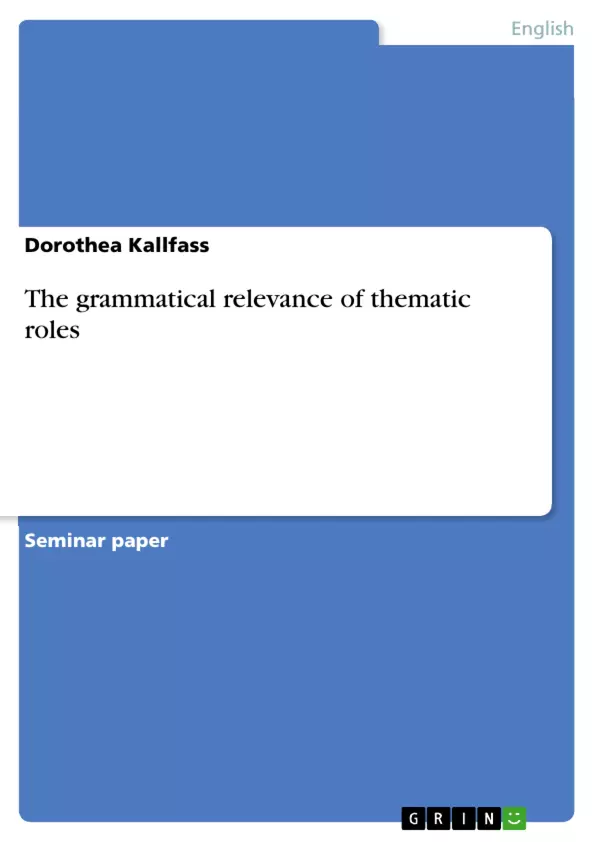Thematic roles are a linguistic phenomenon describing the more specific relations between a predicate and its respective arguments. This is especially important in the field of language acquisition, or, more generally stated, for the process of understanding. A discussion of thematic roles is closely linked to one of the most complex questions ever: what is meaning? Thematic roles are a linguistic approach to this question which is characterized by its comparative simplicity. Still, it is a complex theory.
It ist acknowledged that if you know the grammar of a language you really know this language. Since grammar takes a closer look at units of speech such as sentences, and smaller chunks of sentences, one has to come up with some strategies for interpreting these chunks and the sort of relation they have with each other in order to know grammar. Theta theory is one of these strategies, focusing on "who does what to whom in a clause". In short: a predicate is able to assign certain thematic roles to its respective arguments - we say that predicates have a thematic structure. The part of grammar whicht regulates the assignment of these roles is called theta theory. As an issue of linguistic interest, thematic roles have gained importance during the last two decades.
Theta theory as part of the Government and Binding Theory will be discussed in the following chapters. First, the theory has to be localized in the field of grammar. Then, there follows a brief introduction to Noam Chomsky's current theory of principles and parameters. After these introductory sections the main issues will be addressed, for example the grammatical relevance of thematic roles, and also the question as to which extent theta marking is grammatically realized.
Inhaltsverzeichnis (Table of Contents)
- Introduction
- Government and Binding Theory
- Hypothesis
- Discussion
- e-roles
- Case grammar
- e-roles
- The grammatical relevance of thematic roles
- Ergativity and e-roles - empirical data
- Conclusion
Zielsetzung und Themenschwerpunkte (Objectives and Key Themes)
This thesis examines the grammatical relevance of thematic roles, particularly focusing on their interaction with ergativity. The work aims to explore how theta theory, a component of Government and Binding theory, contributes to understanding the relationship between syntax and semantics.
- Thematic roles and their significance in understanding grammatical structures
- The relationship between thematic roles and lexical semantics
- The debate surrounding the modularity of grammar and the interaction between syntax and semantics
- The role of theta theory in the Government and Binding framework
- Exploring empirical data regarding ergativity and thematic roles
Zusammenfassung der Kapitel (Chapter Summaries)
The introduction lays out the concept of thematic roles and their importance in language acquisition and understanding. It highlights the debate surrounding the grammatical relevance of thematic roles, with different perspectives on their influence on syntactic structures. The chapter also discusses the modularity problem in linguistics, specifically the relationship between syntax and semantics.
The chapter on Government and Binding Theory introduces the core principles of this framework, emphasizing the Projection Principle and its role in connecting lexical information with syntactic representation. This sets the stage for analyzing the interplay between thematic roles and syntactic structures within this theoretical framework.
Schlüsselwörter (Keywords)
This thesis delves into the crucial concepts of thematic roles, ergativity, Government and Binding Theory, lexical semantics, modularity problem, Projection Principle, and the interaction between syntax and semantics. The work explores the grammatical relevance of thematic roles, analyzing empirical data related to ergativity and its connection to theta theory.
Frequently Asked Questions
What are thematic roles in linguistics?
Thematic roles (or theta-roles) describe the specific semantic relationship between a predicate (like a verb) and its arguments (like the subject or object). They help answer "who does what to whom" in a sentence.
What is Theta theory in the context of grammar?
Theta theory is a part of grammar that regulates how thematic roles are assigned to arguments. It is a core component of Noam Chomsky's Government and Binding Theory.
Why are thematic roles important for language acquisition?
Thematic roles are crucial for the process of understanding meaning. They provide a strategy for interpreting sentences and identifying the relations between different parts of speech during language learning.
What is the "Projection Principle" in Theta theory?
The Projection Principle states that lexical information (like the thematic roles a verb requires) must be represented at every level of syntactic structure, connecting the dictionary meaning of words to the sentence structure.
How do thematic roles relate to ergativity?
Ergativity is a grammatical pattern where the subject of an intransitive verb behaves like the object of a transitive verb. Thematic roles provide empirical data to explain how these structures are realized across different languages.
- Quote paper
- Dorothea Kallfass (Author), 2004, The grammatical relevance of thematic roles, Munich, GRIN Verlag, https://www.grin.com/document/66844



